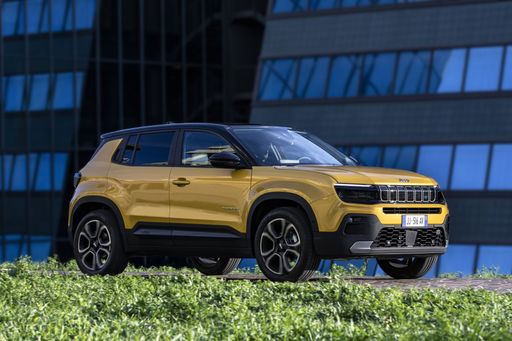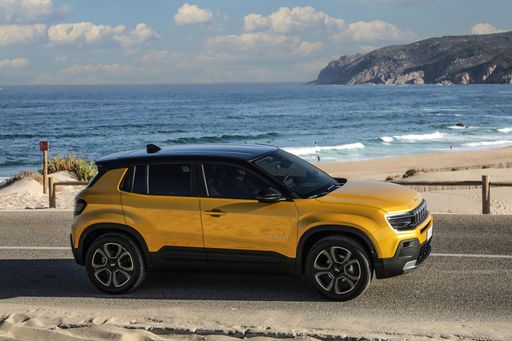Hyundai i20 vs Jeep Avenger - Differences and prices compared
Compare performance (90 HP vs 156 HP), boot space and price (18600 £ vs 21900 £ ) at a glance. Find out which car is the better choice for you – Hyundai i20 or Jeep Avenger?
Costs and Efficiency:
Looking at overall running costs, both models reveal some interesting differences in everyday economy.
Hyundai i20 has a a bit advantage in terms of price – it starts at 18600 £ , while the Jeep Avenger costs 21900 £ . That’s a price difference of around 3342 £.
Fuel consumption also shows a difference: Jeep Avenger manages with 4.90 L and is therefore a bit more efficient than the Hyundai i20 with 5.70 L. The difference is about 0.80 L per 100 km.
Engine and Performance:
Power, torque and acceleration say a lot about how a car feels on the road. This is where you see which model delivers more driving dynamics.
When it comes to engine power, the Jeep Avenger has a significantly edge – offering 156 HP compared to 90 HP. That’s roughly 66 HP more horsepower.
In acceleration from 0 to 100 km/h, the Jeep Avenger is noticeable quicker – completing the sprint in 9 s, while the Hyundai i20 takes 11.50 s. That’s about 2.50 s faster.
There’s also a difference in torque: Jeep Avenger pulls evident stronger with 260 Nm compared to 172 Nm. That’s about 88 Nm difference.
Space and Everyday Use:
Beyond pure performance, interior space and usability matter most in daily life. This is where you see which car is more practical and versatile.
Both vehicles offer seating for 5 people.
In curb weight, Hyundai i20 is barely noticeable lighter – 1145 kg compared to 1180 kg. The difference is around 35 kg.
In terms of boot space, the Jeep Avenger offers hardly perceptible more room – 380 L compared to 352 L. That’s a difference of about 28 L.
When it comes to payload, Jeep Avenger minimal takes the win – 502 kg compared to 465 kg. That’s a difference of about 37 kg.
Who wins the race in the data check?
The Jeep Avenger is decisively ahead in the objective data comparison.
This result only shows which model scores more points on paper – not which of the two cars feels right for you.
Costs and Consumption
View detailed analysis
Engine and Performance
View detailed analysis
Dimensions and Body
View detailed analysis

Jeep Avenger
Hyundai i20
The Hyundai i20 is a cheeky small car that mixes smart styling with sensible practicality, feeling more polished and roomy than you might expect for the money. It’s an easy car to live with, offering engaging handling, a comfy cabin and useful equipment that make daily commutes and weekend errands notably less dull.
details




Jeep Avenger
The Jeep Avenger shrinks Jeep's boxy, adventurous styling into a city-friendly electric crossover that looks just as at home on tight streets as it does on muddy weekend lanes. It's a savvy pick for drivers who want go-anywhere attitude without the truck-size ego — practical inside, lively around town and ready to tackle a bit of rough stuff when the mood strikes.
details




Costs and Consumption |
|
|---|---|
|
Price
18600 - 24000 £
|
Price
21900 - 36900 £
|
|
Consumption L/100km
5.70 L
|
Consumption L/100km
4.9 - 5.7 L
|
|
Consumption kWh/100km
-
|
Consumption kWh/100km
15.50 kWh
|
|
Electric Range
-
|
Electric Range
400 km
|
|
Battery Capacity
-
|
Battery Capacity
51 kWh
|
|
co2
128 - 129 g/km
|
co2
0 - 129 g/km
|
|
Fuel tank capacity
-
|
Fuel tank capacity
44 L
|
Dimensions and Body |
|
|---|---|
|
Body Type
Hatchback
|
Body Type
SUV
|
|
Seats
5
|
Seats
5
|
|
Doors
-
|
Doors
5
|
|
Curb weight
1145 - 1170 kg
|
Curb weight
1180 - 1520 kg
|
|
Trunk capacity
352 L
|
Trunk capacity
325 - 380 L
|
|
Length
-
|
Length
4084 - 4088 mm
|
|
Width
1775 mm
|
Width
1776 mm
|
|
Height
-
|
Height
1527 - 1541 mm
|
|
Max trunk capacity
-
|
Max trunk capacity
1218 - 1277 L
|
|
Payload
455 - 465 kg
|
Payload
494 - 502 kg
|
Engine and Performance |
|
|---|---|
|
Engine Type
Petrol
|
Engine Type
Electric, Petrol, Petrol MHEV
|
|
Transmission
Manuel, Automatic
|
Transmission
Automatic, Manuel
|
|
Transmission Detail
Manual Gearbox, Dual-Clutch Automatic
|
Transmission Detail
Reduction Gearbox, Manual Gearbox, Dual-Clutch Automatic
|
|
Drive Type
Front-Wheel Drive
|
Drive Type
Front-Wheel Drive, All-Wheel Drive
|
|
Power HP
90 HP
|
Power HP
100 - 156 HP
|
|
Acceleration 0-100km/h
11.5 - 12.8 s
|
Acceleration 0-100km/h
9 - 10.6 s
|
|
Max Speed
-
|
Max Speed
150 - 194 km/h
|
|
Torque
172 Nm
|
Torque
205 - 260 Nm
|
|
Number of Cylinders
3
|
Number of Cylinders
3
|
|
Power kW
66 kW
|
Power kW
74 - 115 kW
|
|
Engine capacity
998 cm3
|
Engine capacity
1199 cm3
|
General |
|
|---|---|
|
Model Year
2025
|
Model Year
2023 - 2025
|
|
CO2 Efficiency Class
D
|
CO2 Efficiency Class
A, D, C
|
|
Brand
Hyundai
|
Brand
Jeep
|
What drivetrain options does the Hyundai i20 have?
The Hyundai i20 is offered with Front-Wheel Drive.




